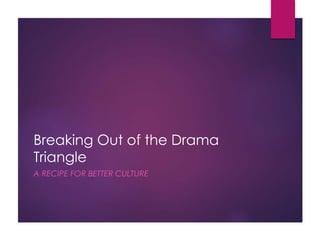
Breaking out of the Drama Triangle
- 1. Breaking Out of the Drama Triangle A RECIPE FOR BETTER CULTURE
- 2. Greg Selvin Agile coach at WWT Asynchrony Labs, based out of Denver greg.selvin@asynchrony.com m 720.588.2899 https://www.linkedin.com/in/gregselvin/
- 3. What is the Drama Triangle? ▶ Invented by psychologist Stephen Karpman in the late 1960’s ▶ A model to describe unhealthy conflict and dysfunctional and sometimes codependent relationships ▶ Grew out of the therapeutic field of transactional analysis Prepared in 2018 by Greg Selvin
- 4. Introduction to the Drama Triangle Persecutor Rescuer Victim Prepared in 2018 by Greg Selvin
- 5. Conflict Style ▶ The Drama Triangle contains 3 different conflict styles ▶ These styles interact in dysfunctional ways ▶ People tend to switch between the three conflict styles based on the situation and relationship(s) ▶ There is a tendency in most people to have a primary conflict style ▶ A person’s conflict style can switch in different situations and relationships Prepared in 2018 by Greg Selvin
- 7. The Victim Role ▶ Relies on others to solve his or her problems ▶ Can lead to catastrophizing ▶ Tries to gain sympathy through telling stories about how he or she has been wronged or hurt ▶ Focuses on what he or she doesn’t like about their circumstances, what they “don’t want” or “don’t like” ▶ Often plays the persecutor role towards himself or herself Prepared in 2018 by Greg Selvin
- 8. The Rescuer Role ▶ Acts as the ‘fixer’ of problems ▶ Assumes another’s problems as a means of control ▶ Fears conflict ▶ Requires validation and needs to be needed ▶ Seeks a Victim to save ▶ Often takes on more work, even when another person can (more appropriately) do the work him or herself. Prepared in 2018 by Greg Selvin
- 9. The Persecutor Role ▶ Acts out in a bullying manner ▶ Places blame on others ▶ Authoritarian – seeks to control the situation ▶ Inflexible ▶ Needs to “win” ▶ Most fears becoming the Victim Prepared in 2018 by Greg Selvin
- 11. Victim Culture A victim culture evinces … ▶ Conflict avoidance ▶ Gloom-and-doom mentality ▶ Learned helplessness ▶ Low morale and engagement ▶ Lack of initiative ▶ Apathy Prepared in 2018 by Greg Selvin
- 13. Rescuer Culture A rescuer culture evinces … ▶ Lack of innovation ▶ Fear of failure ▶ Dependence and even resentment of the leader ▶ Analysis paralysis ▶ Death by meetings ▶ Death by data ▶ Siloes and lack of knowledge sharing ▶ Low collaboration Prepared in 2018 by Greg Selvin
- 15. Persecutor Culture A persecutor culture evinces … ▶ Cutthroat culture ▶ Secrecy, hiding, and avoidance ▶ Anxiety ▶ High turnover ▶ Low accountability ▶ Fear of failure ▶ Zero-sum game mentality (You win, I lose) Prepared in 2018 by Greg Selvin
- 17. The Winner’s Triangle Moving towards health
- 18. The Winner’s Triangle Assertive Caring Vulnerable Prepared in 2018 by Greg Selvin
- 19. Victim to Vulnerable Victim Vulnerable Learn the basic skill of creative problem solving What is the link between being vulnerable and creative problem solving? Prepared in 2018 by Greg Selvin
- 20. The Vulnerable Role ▶ Owns difficult situations as problems to be solved ▶ Sees failure as feedback ▶ Articulates concerns (non-avoidant) ▶ Has self-compassion Prepared in 2018 by Greg Selvin
- 22. Rescuer to Caring Rescuer Caring Learn the basic skill of active listening In what way(s) is active listening important to caring? Prepared in 2018 by Greg Selvin
- 23. The Caring Role ▶ Lets go of the need for control ▶ Listens without trying to fix ▶ Asks thoughtful, non-accusatory questions ▶ Knows when to say no ▶ Delegates ▶ Exhibits humility Prepared in 2018 by Greg Selvin
- 25. Persecutor to Assertive Persecutor Assertive Learn the basic skill of boundary setting How do healthy boundaries prevent persecution? Prepared in 2018 by Greg Selvin
- 26. The Assertive Role ▶ Expresses needs in a direct and diplomatic way ▶ Practices empathy ▶ Tends to express thoughts in terms of “I or me” instead of “you” ▶ Values the thoughts and opinions of others – “We” Passive You Win Aggressive I Win Assertive No need to win Prepared in 2018 by Greg Selvin
- 28. Healthy Culture Moving away from the Drama Triangle
- 29. Healthy Culture ▶ Respectful ▶ Innovative ▶ Focused on real priorities ▶ Aligned ▶ Collaborative When you move away from the Drama Triangle, you may see the following cultural changes . . . ▶ Transparent ▶ Joyful ▶ Problem focused ▶ Accountable . . . What cultural shifts might you anticipate? Prepared in 2018 by Greg Selvin
- 30. Key Takeaways 1. Knowing some indicators that exhibit dysfunctional roles and behavior 1. Some simple steps to move to health, functional relationship dynamics 1. Address dysfunction at the interpersonal level to lay the foundation for a healthier culture Prepared in 2018 by Greg Selvin
